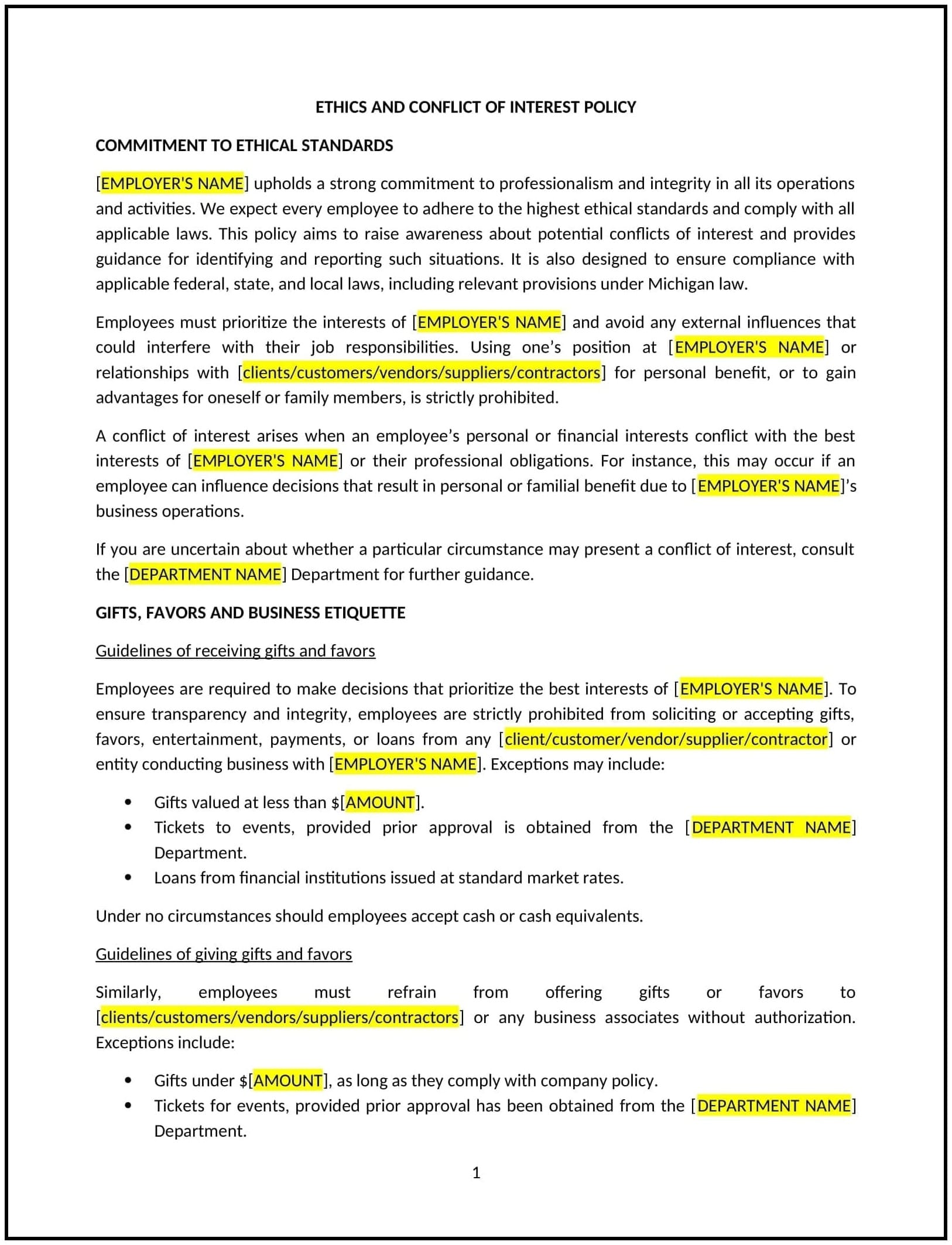Ethics and conflict of interest policy (Michigan): Free template
Got contracts to review? While you're here for policies, let Cobrief make contract review effortless—start your free review now.

Customize this template for free
Ethics and conflict of interest policy (Michigan)
An ethics and conflict of interest policy provides Michigan businesses with guidelines for maintaining integrity and transparency in all business dealings. This policy helps employees identify, address, and avoid situations where personal interests may conflict with the business’s interests. It ensures that all business decisions are made in the best interests of the company, without improper influence or bias.
By adopting this policy, businesses can foster a culture of ethical behavior, reduce the risk of unethical practices, and ensure that employees act in ways that protect the company’s reputation and legal standing.
How to use this ethics and conflict of interest policy (Michigan)
- Define conflicts of interest: Clearly describe what constitutes a conflict of interest, such as personal relationships, financial interests, or outside business activities that may influence an employee’s decisions or actions at work.
- Set disclosure requirements: Establish procedures for employees to disclose any potential conflicts of interest, including when they should notify management, what information is required, and the timeframe for disclosure.
- Provide guidelines for handling conflicts: Specify the steps that employees should take to address potential conflicts, such as recusing themselves from decisions, divesting from certain interests, or seeking guidance from HR or management.
- Establish ethics standards: Outline the ethical standards expected of all employees, including honesty, transparency, fairness, and respect for others, and provide examples of behaviors that align with these values.
- Set consequences for violations: Clearly state the consequences for failing to disclose a conflict of interest or engaging in unethical conduct, which may include disciplinary action, up to and including termination.
- Educate employees: Provide regular training on identifying and managing conflicts of interest, as well as reinforcing the importance of ethics in business decision-making.
- Monitor compliance: Regularly assess and monitor adherence to the policy, ensuring that conflicts of interest are disclosed and addressed appropriately, and that ethical standards are upheld across all business functions.
Benefits of using this ethics and conflict of interest policy (Michigan)
This policy provides several key benefits for Michigan businesses:
- Promotes integrity and trust: By establishing clear ethical standards and addressing conflicts of interest, businesses build trust with employees, customers, and stakeholders.
- Reduces legal risks: The policy helps businesses avoid situations that could lead to legal issues, such as lawsuits, regulatory violations, or reputational damage due to conflicts of interest.
- Enhances decision-making: When conflicts of interest are avoided or disclosed, business decisions are more likely to be fair, transparent, and in the best interests of the company.
- Protects the company’s reputation: Ethical behavior strengthens the company’s reputation and fosters a positive public image, which can lead to increased customer loyalty and trust.
- Improves employee morale: Employees who work in an ethical environment where conflicts of interest are addressed feel more confident in the fairness and integrity of the workplace, leading to higher job satisfaction and engagement.
Tips for using this ethics and conflict of interest policy (Michigan)
- Communicate the policy: Ensure that employees are aware of the policy by including it in the employee handbook, conducting onboarding training, and providing periodic reminders about the importance of ethics and conflict of interest disclosure.
- Be proactive in addressing conflicts: Encourage employees to disclose potential conflicts of interest as soon as they arise, rather than waiting for an issue to escalate.
- Provide examples: Use real-world examples of common conflicts of interest to help employees better understand what constitutes a conflict and how to handle it.
- Ensure fairness: When addressing conflicts of interest, businesses should ensure that all employees are treated equally and fairly, with the same procedures applied consistently across the organization.
- Review periodically: Regularly review and update the policy to reflect changes in Michigan laws, industry standards, or business practices related to ethics and conflicts of interest.